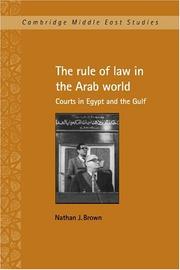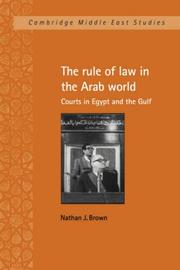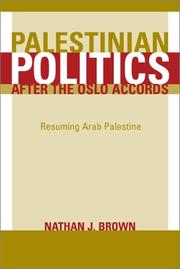| Listing 1 - 10 of 27 | << page >> |
Sort by
|
Book
ISBN: 9780190619428 Year: 2017 Publisher: New York, NY : Oxford University Press,
Abstract | Keywords | Export | Availability | Bookmark
 Loading...
Loading...Choose an application
- Reference Manager
- EndNote
- RefWorks (Direct export to RefWorks)
Arguing Islam after the Rebirth of Arab Politics analyzes the politics of religion in the Arab world after the emergence of new public spheres over the past few decades. The book examines those spheres as they really are, not measuring them against any ideal of democratic deliberation, and show how they are lively and increasingly participatory but also polarizing, divisive, and far from egalitarian. And while they have grown in force, they are not efficacious, leading to a widening gap between regimes and the societies they govern. Focusing on arguments aired in new and old media, neighborhood discussions, and parliaments, Arguing Islam After the Revival of Arab Politics probes in special depth debates over constitution, family law, and education. It shows how these various places where arguments take place are increasingly linked, forming not a uniformed citizenry but instead a badly divided one in which a leader's words to followers are overheard and then lampooned by opponents and various groups become aware of how deeply they differ. Arguments are detached from the authority of the person making them. Without a strong political process to forge agreement and reward coalition building, the reborn Arab politics is exciting and vital but also noisy and rough.
Islam and politics --- Arab countries --- Politics and government --- Espace public (science politique) --- Islam et politique --- Pays arabes --- Politique et gouvernement --- Arab world --- Arabic countries --- Arabic-speaking states --- Islamic countries --- Middle East

ISBN: 0521590264 0521030684 0511583273 0511002734 9780521590266 9780511002731 9780511583278 9780521030687 Year: 1997 Volume: 6 Publisher: Cambridge : Cambridge University Press,
Abstract | Keywords | Export | Availability | Bookmark
 Loading...
Loading...Choose an application
- Reference Manager
- EndNote
- RefWorks (Direct export to RefWorks)
Nathan Brown's penetrating account of the development and operation of the courts in the Arab world is based on fieldwork in Egypt and the Gulf. The book addresses several important questions. Why, for example, did Egypt's political leaders construct an independent judicial system that limited their own authority? And why does such a system appeal to Arab rulers outside Egypt? While most accounts stress the role of imperialism or liberal ideology, the author maintains that the primary purpose of the system is to provide support for the officially sanctioned order. The model offers similar attractions for other Arab rulers. From the theoretical perspective, the book will contribute to the debates about liberal legality, political change and the relationship between law and society in the developing world. It will be read by scholars of the Middle East, law students and those interested in the history of law and its evolution.
Courts --- Rule of law --- Tribunaux --- Règle de droit --- -Courts --- -Rule of law --- -Supremacy of law --- Administrative law --- Constitutional law --- Judiciary --- Dispute resolution (Law) --- Judicial districts --- Law --- Procedure (Law) --- Judicial power --- Jurisdiction --- Justice, Administration of --- Law and legislation --- Règle de droit --- Supremacy of law --- Arab countries --- Egypt --- Persian Gulf States --- Courts - Arab countries. --- Courts - Egypt. --- Courts - Persian Gulf States. --- Rule of law - Arab countries. --- Rule of law - Egypt. --- Rule of law - Persian Gulf States. --- General and Others --- Courts - Arab countries --- Courts - Egypt --- Courts - Persian Gulf States --- Rule of law - Arab countries --- Rule of law - Egypt --- Rule of law - Persian Gulf States
Book
ISBN: 0300045387 Year: 1990 Publisher: New Haven, Conn. Yale University Press
Abstract | Keywords | Export | Availability | Bookmark
 Loading...
Loading...Choose an application
- Reference Manager
- EndNote
- RefWorks (Direct export to RefWorks)
History of Africa --- anno 1910-1919 --- anno 1900-1909 --- anno 1930-1939 --- anno 1940-1949 --- anno 1800-1899 --- anno 1950-1959 --- anno 1920-1929 --- Egypt
Book
ISBN: 0190619430 0190619457 0190619449 Year: 2016 Publisher: New York, NY : Oxford University Press,
Abstract | Keywords | Export | Availability | Bookmark
 Loading...
Loading...Choose an application
- Reference Manager
- EndNote
- RefWorks (Direct export to RefWorks)
'Arguing Islam after the Revival of Arab Politics' analyzes the politics of religion in the Arab world after the emergence of new public spheres over the past few decades. The work examines those spheres as they really are, not measuring them against any ideal of democratic deliberation.
Islam and politics --- Arab countries --- Politics and government --- Arab world --- Arabic countries --- Arabic-speaking states --- Islamic countries --- Middle East

ISBN: 9780521590266 9780521030687 9780511583278 0521590264 Year: 2006 Volume: 6 Publisher: Cambridge Cambridge University Press
Abstract | Keywords | Export | Availability | Bookmark
 Loading...
Loading...Choose an application
- Reference Manager
- EndNote
- RefWorks (Direct export to RefWorks)
Sociology of law --- Arab Gulf States --- Egypt --- Courts --- Rule of law --- Supremacy of law --- Administrative law --- Constitutional law --- Judiciary --- Dispute resolution (Law) --- Judicial districts --- Law --- Procedure (Law) --- Judicial power --- Jurisdiction --- Justice, Administration of --- Law and legislation --- Tribunaux --- Règle de droit --- Courts - Arab countries. --- Courts - Egypt. --- Courts - Persian Gulf States. --- Rule of law - Arab countries. --- Rule of law - Egypt. --- Rule of law - Persian Gulf States.

ISBN: 079148968X 9780791489680 9780791451588 0791451585 0791451585 0791451577 9780791451571 Year: 2002 Publisher: Albany, New York : State University of New York Press,
Abstract | Keywords | Export | Availability | Bookmark
 Loading...
Loading...Choose an application
- Reference Manager
- EndNote
- RefWorks (Direct export to RefWorks)
The collapse of authoritarian regimes and the global resurgence of liberal democracy has led to a renewed interest in constitutions and constitutionalism among scholars and political activists alike. This book uses the Arab experience to explain the appeal of constitutional documents to authoritarian regimes and assesses the degree to which such constitutions can be used in the effort to make the regimes more accountable.
Book
ISBN: 0801477727 0801464366 0801463890 9780801464362 9780801450365 9780801477720 9780801463891 0801450365 1322504938 Year: 2012 Publisher: Ithaca
Abstract | Keywords | Export | Availability | Bookmark
 Loading...
Loading...Choose an application
- Reference Manager
- EndNote
- RefWorks (Direct export to RefWorks)
Throughout the Arab world, Islamist political movements are joining the electoral process. This change alarms some observers and excites other. In recent years, electoral opportunities have opened, and Islamist movements have seized them. But those opportunities, while real, have also been sharply circumscribed. Elections may be freer, but they are not fair. The opposition can run but it generally cannot win. Semiauthoritarian conditions prevail in much of the Arab world, even in the wake of the Arab Spring. How do Islamist movements change when they plunge into freer but unfair elections? How do their organizations (such as the Muslim Brotherhood) and structures evolve? What happens to their core ideological principles? And how might their increased involvement affect the political system?In When Victory Is Not an Option, Nathan J. Brown addresses these questions by focusing on Islamist movements in Egypt, Jordan, Kuwait, and Palestine. He shows that uncertain benefits lead to uncertain changes. Islamists do adapt their organizations and their ideologies do bend-some. But leaders almost always preserve a line of retreat in case the political opening fizzles or fails to deliver what they wish. The result is a cat-and-mouse game between dominant regimes and wily movements. There are possibilities for more significant changes, but to date they remain only possibilities.
Islam and politics --- Political parties --- Islamic fundamentalism --- Fundamentalism, Islamic --- Islamism --- Islam --- Religious fundamentalism --- Parties, Political --- Party systems, Political --- Political party systems --- Political science --- Divided government --- Intra-party disagreements (Political parties) --- Political conventions --- Arab countries --- Politics and government

ISBN: 1597347930 0520937783 9780520937789 1417508175 9781417508174 0520241150 9780520241152 9781597347938 0520237625 9780520237629 Year: 2003 Publisher: Berkeley (Calif.) University of California Press
Abstract | Keywords | Export | Availability | Bookmark
 Loading...
Loading...Choose an application
- Reference Manager
- EndNote
- RefWorks (Direct export to RefWorks)
This timely and critically important work does what hostilities in the Middle East have made nearly impossible: it offers a measured, internal perspective on Palestinian politics, viewing emerging political patterns from the Palestinian point of view rather than through the prism of the Arab-Israeli conflict. Based on groundbreaking fieldwork, interviews with Palestinian leaders, and an extensive survey of Arabic-language writings and documents, Palestinian Politics after the Oslo Accords presents the meaning of state building and self-reliance as Palestinians themselves have understood them in the years between 1993 and 2002.Nathan J. Brown focuses his work on five areas: legal development, constitution drafting, the Palestinian Legislative Council, civil society, and the effort to write a new curriculum. His book shows how Palestinians have understood efforts at building institutions as acts of resumption rather than creation-with activists and leaders seeing themselves as recovering from an interrupted past, Palestinians seeking to rejoin the Arab world by building their new institutions on Arab models, and many Palestinian reformers taking the Oslo Accords as an occasion to resume normal political life. Providing a clear and urgently needed vantage point on most of the issues of Palestinian reform and governance that have emerged in recent policy debates-issues such as corruption, constitutionalism, democracy, and rule of law-Brown's book helps to put Palestinian aspirations and accomplishments in their proper context within a long and complex history and within the larger Arab world.
Nation-state. --- Palestinian Arabs --- National state --- State, The --- National interest --- Self-determination, National --- Politics and government --- Palestinian National Authority. --- Palestinian Authority --- Sulṭah al-Waṭanīyah al-Filasṭīnīyah --- Palestine National Authority --- PNA --- Sulṭah al-Filasṭīnīyah --- 20th century. --- arab israeli conflict. --- arab national models. --- arab palestine. --- arab world. --- constitutionalism. --- fieldwork. --- historical. --- history buffs. --- insider perspective. --- interviews. --- legal development. --- middle east. --- nation building. --- nonfiction. --- oslo accords. --- palestine. --- palestinian legislative council. --- palestinian politics. --- palestinian reformers. --- political perspective. --- political science. --- politics. --- social activists. --- textbooks. --- world politics.
Book
ISBN: 9781421400082 9781421400099 Year: 2011 Publisher: Baltimore, Md Johns Hopkins University Press
Abstract | Keywords | Export | Availability | Bookmark
 Loading...
Loading...Choose an application
- Reference Manager
- EndNote
- RefWorks (Direct export to RefWorks)
Digital
ISBN: 9780801463891 9780801477720 Year: 2012 Publisher: Ithaca, N.Y. Cornell University Press
Abstract | Keywords | Export | Availability | Bookmark
 Loading...
Loading...Choose an application
- Reference Manager
- EndNote
- RefWorks (Direct export to RefWorks)
| Listing 1 - 10 of 27 | << page >> |
Sort by
|

 Search
Search Feedback
Feedback About UniCat
About UniCat  Help
Help News
News